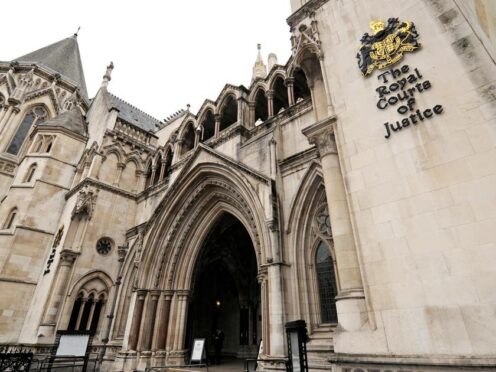
An oligarch sanctioned in the wake of the invasion of Ukraine and a businessman whose superyacht was detained by the Government have both lost Court of Appeal bids.
Eugene Shvidler, who was born in the former Soviet Union before moving to the US as a stateless refugee in 1989, was sanctioned by the Foreign Office using 2019 regulations over his links to Roman Abramovich and to a steel mining company with operations in Russia.
The billionaire brought a legal challenge against the decision, made in March 2022, in a bid to be relieved from the sanctions, and his case was the first of its kind to be considered by the High Court.
Mr Shvidler, who holds dual UK and US nationality, sought a declaration that his designation under post-Brexit regulations on sanctions was unlawful, and an order quashing the designation.
After his bid was dismissed at the High Court, Mr Shvidler took his case to the Court of Appeal alongside Russian businessman Sergei Naumenko.
Mr Naumenko had brought his own legal action over the detention of the £38 million custom-built superyacht The Phi, which remains docked in Canary Wharf, east London.
In March 2022, then-Transport Secretary Grant Shapps posted a photo of himself with the yacht on X, formerly known as Twitter, as well as a TikTok video, announcing its detention.
Mr Naumenko and two companies challenged the move but lost a High Court bid.
And in a ruling on Tuesday, both men lost their appeals.
Mr Shvidler’s lawyers had argued that the impact of the sanctions on him and his family were “manifestly disproportionate”, with two of his children required to leave their UK schools after his designation.
In the 55-page judgment, Lord Justice Singh said: “I would accept that these sanctions are both severe and open-ended.
“But this does not meet the fundamental point that sanctions often have to be severe and open-ended if they are to be effective.
“If sanctions are to be effective, a serious price has to be paid by those who are within the definition of people to be designated under the 2019 Regulations.
“On the other side of the balance is Russia’s very serious violation of international law and the need to bring the invasion of Ukraine to an end.”
Addressing Mr Naumenko’s appeal, Lord Justice Singh – sitting with Sir Geoffrey Vos and and Lady Justice Whipple – said the Foreign Office has not designated the businessman as being “involved” in activities against Ukraine or having “obtained a benefit” from supporting the Russian authorities.
However, he continued: “Given the likely direct and indirect links between Mr Naumenko’s wealth, economic activities, and the Russian state, it is rational to consider that he is the sort of individual on whom sanctions could effect the ‘broad and deep impact’ which Parliament intended via the ‘connected with Russia’ powers in, at least, weakening their tacit support for the regime.”

Enjoy the convenience of having The Sunday Post delivered as a digital ePaper straight to your smartphone, tablet or computer.
Subscribe for only £5.49 a month and enjoy all the benefits of the printed paper as a digital replica.
Subscribe